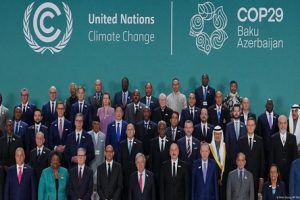
In the modern world, people are faced with a plethora of pressing challenges that demand their immediate attention and collective action. While conflicts and wars have long been a prominent concern for humanity, we also find ourselves confronted by an issue that knows no borders and affects every corner of the globe: climate change. Beyond the traditional threats of war and conflict, climate change has emerged as one of the most formidable challenges of our time, with far-reaching implications for the planet and its inhabitants.
Climate change which is characterized by rising global temperatures and the disruption of natural weather patterns has become a defining issue in today’s world. Its impact extends far beyond mere conflicts and geopolitical disputes, affecting every aspect of human life, including the economy, environment, and social fabric of nations. The recent unexpected flood in in places like in Dubai serve as a stark reminder of the far-reaching consequences of climate change.
The recent flooding in Dubai is not an isolated incident. Across the world, we have witnessed an increase in the frequency and intensity of extreme weather events, including floods, hurricanes, and wildfires. These events disrupt lives, destroy infrastructure, and cause immense human suffering. Developing countries, in particular, bear the brunt of these disasters, as they often lack the necessary resources and infrastructure to cope with the aftermath.
The reality of climate change is no longer a matter of debate or speculation. Overwhelming scientific evidence confirms that human activities, particularly the burning of fossil fuels and deforestation, are the primary drivers of global warming and its associated effects.
Climate change transcends geopolitical boundaries and impacts the entire planet. Moreover, climate change exacerbates existing social, economic, and political vulnerabilities. It intensifies poverty, inequality, and displacement, placing additional strain on already fragile societies. The scarcity of resources, competition for land and water, and the displacement of people due to environmental factors can fuel conflicts and create new geopolitical tensions.
Addressing climate change and its associated impacts requires a holistic approach. It demands a shift in mindset, policy, and practice. Governments, businesses, and individuals must come together to mitigate greenhouse gas emissions, promote sustainable practices, and invest in climate resilience and adaptation measures. International cooperation and collaboration are crucial to developing innovative solutions and sharing knowledge and resources.
Furthermore, nations need to promote and accelerate the transition to renewable energy sources, invest in clean technologies, and adopt sustainable practices in sectors such as agriculture, transportation, and industry. Moreover, adaptation and resilience-building measures are needed to protect vulnerable communities from the impacts of climate change.
In recent years, the world has witnessed an increasing urgency to address the challenges of climate change and environmental degradation. Nations across the globe have recognized the necessity of adopting sustainable practices and implementing innovative solutions to mitigate the impact of human activities on the planet. Among these nations, Ethiopia has emerged as a pioneer in environmental conservation and reforestation through its groundbreaking initiative, the Ethiopian Green Legacy Program.
Recognizing the urgency of addressing these challenges, the Ethiopian government launched the Green Legacy Program as a strategic response that is a symbol of environmental stewardship and community resilience.
According to a report by the Government Communication Service, under the Green Legacy Program, about 32.5 billion saplings have been planted in the past five years. Some 84 % of the seedlings planted so far are reported to have survived. Usman Surur, the Rural Development Sector Co-Coordinator and Head of Agriculture Bureau of the Central Ethiopia Region stated in research conducted by the region in collaboration with the Ministry of Agriculture that the majority of the seedlings have survived This indicates a high success rate in the region’s reforestation efforts and reflects their commitment to sustainable forestry practices.
He stated that their ongoing efforts focus on preserving and nurturing forest resources through the Green Legacy program. This initiative aims not only planting new saplings year in, year out but also ensuring a better chance of survival the previously planted ones. By focusing on the care and thriving of saplings from previous years, the region demonstrates its long-term approach to reforestation and environmental stewardship.
The program aims to restore degraded landscapes, rehabilitate forests, and reclaim deforested areas through large-scale tree planting. By increasing the country’s forest cover, the program seeks to contribute to global efforts to mitigate climate change by sequestering carbon dioxide from the atmosphere.
He also emphasized that Ethiopia’s forest development initiatives have far-reaching benefits beyond its borders. By reducing the risks of drought and floods in East African countries, these efforts contribute to regional climate resilience. Furthermore, the increased forest cover enhances peace and food security in the region by providing crucial ecosystem services such as soil conservation, water regulation, and habitat preservation.
He mentioned that in the current year’s green footprint pre-planting event, the region has set an ambitious target of growing approximately 390 million saplings. This demonstrates their dedication to scaling up reforestation efforts and making a significant impact on the region’s forest cover. Notably, more than 87 million saplings have already been planted in Enset (false banana) alone this year, indicating substantial progress towards achieving this target.
He stated that the majority of the agro-forestry trees will be planted according to this year’s schedule. Additionally, he emphasized that the decision to replace certain tree species, such as eucalyptus, with native trees and fruit trees is significant. Eucalyptus trees are known to have high water requirements and can deplete soil fertility over time. Native trees, on the other hand, are better adapted to the local ecosystem and can provide various ecological benefits, such as promoting biodiversity and improving soil health. Also, fruit trees like coffee, avacodo, mangoes, and others not only contribute to the agro-forestry system but also offer the potential for economic gains through the production of fruits, he noted.
The program has generated numerous socioeconomic benefits for local communities. Local communities involved in the Green Legacy Program have witnessed improvements in their livelihoods and increased resilience to climate change. The program has created employment opportunities, particularly for rural communities, through activities such as seedling production, and tree planting. This has helped to alleviate poverty and improve income levels.
The reforestation efforts under the program also contribute to soil conservation and water management. The increased forest cover helps to reduce soil erosion, improve soil fertility, and regulate water flow, benefiting agricultural productivity in the region. The program encourages agroforestry practices, which integrate trees with agricultural crops, providing additional income sources for farmers.
Furthermore, the Green Legacy Program promotes community participation and awareness about environmental conservation. It fosters a sense of ownership and responsibility among local communities, encouraging them to take an active role in preserving and protecting their natural resources. This community engagement leads to a stronger connection between communities and their environment, promoting sustainable practices beyond the scope of the program.
The success of the Ethiopian Green Legacy Program has garnered international recognition and inspired other nations to undertake similar initiatives. It serves as an exemplary model for reforestation and environmental conservation efforts globally. The program’s ambitious goals and tangible results demonstrate the transformative power of collective action in addressing climate change and promoting sustainable development.
Furthermore, climate change presents a complex and interconnected set of challenges that require global cooperation and innovative solutions. Also, climate change poses a distinct threat that affects all nations and transcends geopolitical boundaries. The Ethiopian Green Legacy Program exemplifies a proactive and holistic approach to addressing climate change through reforestation and environmental conservation. By focusing on sustainable practices, community participation, and long-term stewardship, the program not only contributes to climate mitigation but also generates socioeconomic benefits for local communities. It stands as a shining example of how nations can work together to combat climate change and build a more sustainable future for all.
FIKADU BELAY
THE ETHIOPIAN HERALD TUESDAY 30 APRIL 2024





